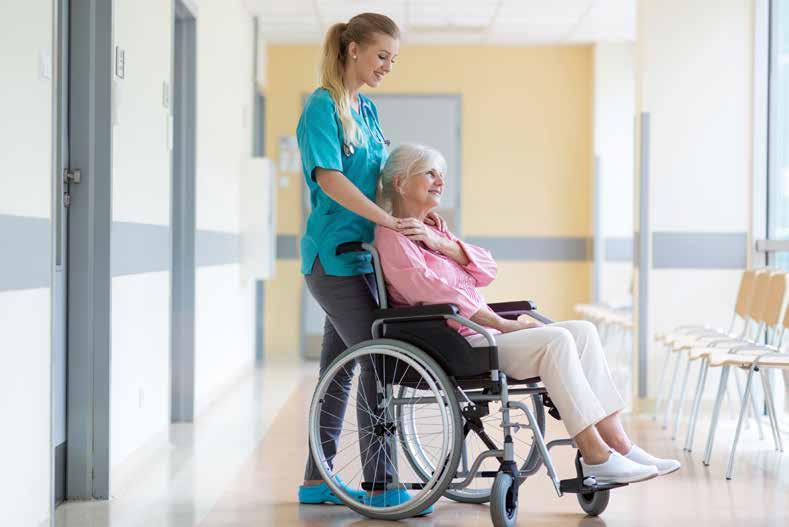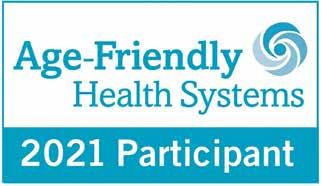
3 minute read
Age-Friendly Healthcare at Saratoga Hospital
A New Era of Age-Friendly Healthcare What It Means for Older Adults
Photo: Fellowship-trained geriatrician Mallory Otto, MD, is a member of Saratoga Hospital Medical Group – Geriatric Care. Cindi Lisuzzo, BS, RN, Certified Case Manager, is Director of Care Management at Saratoga Hospital. Michelle Little, BS, RN, Certified Medical-Surgical Registered Nurse, is Director of the Cardiac-Renal Medical-Surgical Unit at Saratoga Hospital. Learn more at SaratogaHospital.org
WRITTEN BY MALLORY OTTO, MD, CINDI LISUZZO BS, RN, CCM, AND
MICHELLE LITTLE BS, RN, CMSRN OF SARATOGA HOSPITAL

Saratoga County’s population of residents over age 65 has grown more than 50% in the last decade. Our community needs are changing, both in healthcare settings and at home. As people are living longer, they are needing care for multiple chronic conditions and, often, some form of disability. In addition, older adults have lost much during the pandemic. Long-term social isolation is a serious concern, and while it has been hard on everyone, it’s been especially distressing for older adults. Even before COVID-19, nearly one-fourth of Americans 65 and older were considered socially isolated. This is why age-friendly care is important now, and well beyond the pandemic. Age-friendly care is an approach to healthcare, both inpatient and outpatient, that focuses on meeting the unique needs of older patients. It takes into account their priorities and personal definitions of quality of life. The good news is that there is a growing movement to provide such care across the nation—and Saratoga Hospital is part of that movement. Nonclinical senior facilities and families have roles to play, too. Working with The Healthcare Association of New York State Upstate New York Cohort Action Community, Saratoga Hospital is participating in AgeFriendly Health Systems, an initiative of The John A. Hartford Foundation and the Institute for Healthcare Improvement, in partnership with the American Hospital Association and the Catholic Health Association of the United States. As a participant, Saratoga Hospital is recognized as being on the journey to becoming named an Age-Friendly Health System Committed to Care Excellence.

As part of the initiative, Saratoga Hospital is implementing a set of evidence-based interventions specifically designed to improve care for older patients. Known as the “4Ms,” these interventions include: • What Matters: Know and align care with each older adult’s specific health outcome goals and care preferences across settings of care, including, but not limited to, end-of-life care. • Medication: If medication is necessary, use age-friendly medication that does not interfere with What Matters to the older adult, Mobility, or Mentation across settings of care. • Mentation: Prevent, identify, treat, and manage dementia, depression, and delirium across settings of care. • Mobility: Ensure that older adults move safely every day in order to maintain function and do What Matters. Age-Friendly Care begins with what matters most to older adults. When we learn what matters to them, we document it, discuss it with the patient’s care team, and incorporate it into their care plans. These priorities are considered in every decision regarding the patient’s medication, mental activity, and mobility. We share the information across the emergency department, intensive care units, medical-surgical units, general units, and primary and specialty care settings. Understanding what matters to older adults enables us not only to tailor their care plans but also to build trust, especially now, when families can’t be here. Our staff are forging connections with our older adult patients, calming their fears, sharing in their memories, and making them feel comfortable. More than half of our patients are geriatric, and we have long embraced the values behind these interventions. We’ve seen, firsthand, the difference this Age-Friendly initiative can make for our patients and their loved ones. We’re excited to be part of this movement and help ensure that patients receive Age-Friendly Care during their time in the hospital in preparation for return to the community. Working together with families and our civic partners, we can promote the physical, emotional, and cognitive wellbeing of older adults. That, in turn, will have a lasting impact on our communities. Learn more about Age-Friendly Health Systems and the “4Ms” at ihi.org/AgeFriendly. SF











